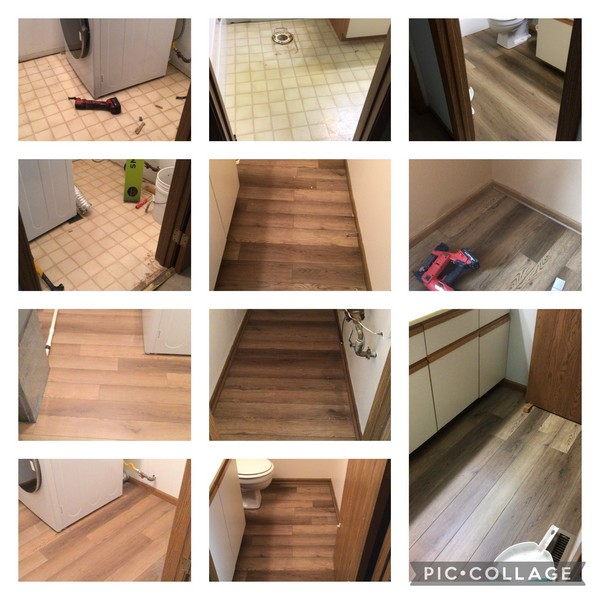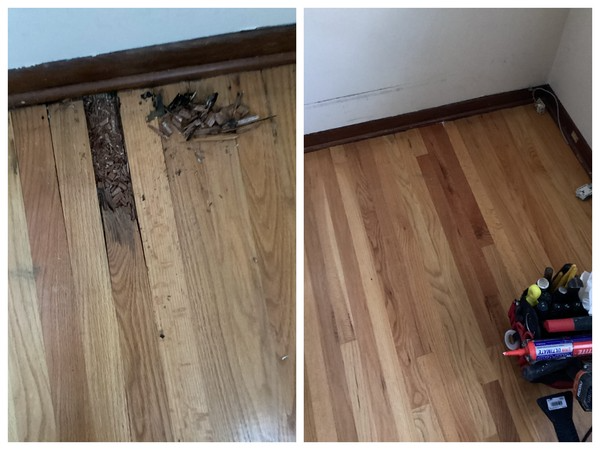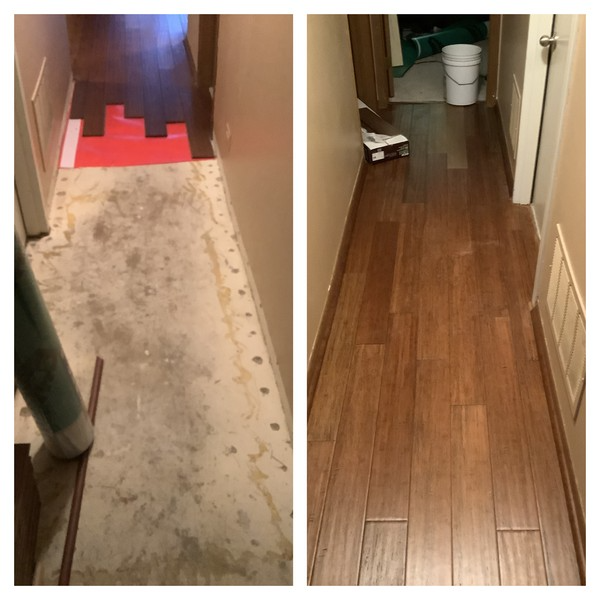How to Choose the Best Types of Flooring for Your Home
There is a wide range of flooring materials to choose from when searching for the perfect option. Having a wide variety of materials available can be exciting if you're in the market for new flooring, however, it can also be distracting. When it comes to making a purchase, the majority of homeowners take into consideration the cost, aesthetic appeal, and how well it aligns with their home and personal requirements. If you're thinking about buying new flooring for a specific room in your home or starting a major renovation, understanding which types of flooring are best suited for different rooms and climates can help you make informed decisions about what to purchase.
Furthermore, pets and children play a big role in deciding which types of flooring will not only last, but continue to look good for years. Usually, individuals who own pets tend to avoid certain if not all carpet styles in their homes due to the challenges it presents in terms of concealing pet hair and accidents, as opposed to tile floors. Solid hardwood flooring is the most durable flooring option for families with active children, as it offers exceptional durability that will withstand the test of time. At the end of the day, the decision on what type of flooring to buy is purely up to you.
This guide will present you with popular flooring options, their various varieties, and the best places in your home to use them. Climate plays a big role in determining which type of flooring is best for your home. In areas with high humidity, such as bathrooms and basements, waterproof and water-resistant flooring options like vinyl or tile are more suitable. It's important to consider both your lifestyle and the climate when selecting the right flooring for your home. On installation day, rest assured that our dedicated Wheaton-Hinsdale handyman team from Mr. Handyman will deliver a seamless and impeccable installation experience!
Types of Flooring to Consider
Vinyl Flooring

Vinyl floors offer remarkable durability and outstanding cost-effectiveness. They are crafted from various types of plastic, primarily acrylic, PVC, and similar polymers. This economical choice caters to homeowners seeking both a touch of opulence and the resilience found in commercial-grade flooring. There are two main types of vinyl flooring: Luxury vinyl tiles (LVT) and vinyl roles. Both LVT and vinyl roll are made from the same materials, but they are constructed differently to achieve different effects. For example, the plank format is ideal for mimicking the look of natural materials such as wood. Regular vinyl flooring is resistant to water since it's waterproof. Luxury vinyl flooring is thicker and more durable than standard vinyl, which makes it a great choice for high-traffic areas or homes with pets. This type of flooring is available as:
- Luxury vinyl tile
- Sheet vinyl flooring
- Luxury vinyl plank
- Traditional vinyl
- Peel and stick vinyl
Laminate Flooring
Laminate floors offer the opportunity to have the exquisite appearance of real wood, tile, or natural stone floors, but without breaking the bank. What's more, you'll find that laminate requires much less upkeep compared to traditional flooring options. Made of melamine resin and fiberboard materials, laminate flooring showcases a remarkable construction, and has four distinct layers.
Each layer serves a crucial purpose, ensuring durability and longevity. The protective back layer shields against moisture, providing stability to the whole floor. Just above it, the sturdy core layer, crafted from high-density board, defends the flooring from indentations and further moisture damage. Resting atop the core layer, the design layer exhibits a stunning, high-resolution photographic image, mimicking the floor's surface appearance. Lastly, the wear layer, composed of clear aluminum oxide, acts as a shield against water, spills, fading, stains, and everyday mishaps, adding an extra layer of resilience to the laminate flooring.
With scratch-resistant, waterproof, noise-resistant, and even heated alternatives available in a wide range of appealing and hassle-free styles, it's no wonder that laminate flooring has become such a sought-after option for homeowners. This type of flooring is available as:
- Wood-like laminate
- Tile-like laminate
Hardwood Flooring

Hardwood floors are renowned for their durability and timeless, elegant appearance. They can be refinished multiple times, allowing you to adapt their look to complement a newly decorated room. Although initial costs may be higher, many homeowners value hardwood flooring for its enduring quality and aesthetic appeal. Whether you choose to install the flooring yourself or hire professionals, there are two primary types of hardwood flooring to consider: solid hardwood floors, milled from a single piece of wood, and engineered hardwood floors, which feature a multi-layer base with real wood on the surface. Engineered wood flooring often provides a more budget-friendly alternative to solid hardwood. This type of flooring is available as:
- Solid hardwood: This type of flooring features various solid wood types including red oak, white oak, cherry, walnut, hickory, and maple. These natural hardwood options exude timeless beauty, but they do require regular maintenance and care to keep their natural beauty.
- Engineered wood flooring: These flooring options are not only available in waterproof versions, but also in scratch and dent-resistant variants. These choices are absolutely perfect for areas with high moisture content such as kitchens and bathrooms, as well as busy spaces like hallways. Moreover, families with children and pets will greatly benefit from these incredible hardwood flooring options.
Tile Flooring
Tile floors are the ideal option for high-moisture rooms that may become wet, such as bathrooms, kitchens, laundry rooms, and basements. Tiles offer incredible versatility and durability, requiring minimal maintenance. Moreover, numerous tile textures are available that beautifully imitate the natural look of wood and stone. This type of flooring is available as:
- Ceramic tile: This type of tile, made from clay, is durable enough for most rooms in the house. Its softer, more comfortable walking surface sets it apart from other types of tile flooring.
- Porcelain tile: Porcelain tiles are fired at a higher temperature compared to ceramic tiles, which enhances their durability, water resistance, and less of a porous material.
- Natural stone tile: Natural stone comprises a wide range of materials such as granite, marble, slate, and others, all of which boast a captivating and sophisticated aesthetic.
- Metal
- Cement
- Engineered tile
Linoleum Flooring
Linoleum flooring is created using natural materials like linseed oil, cork dust, wood flour, and resins, which are compressed onto a backing material. This unique composition provides linoleum with water resistance, making it less susceptible to damage from occasional spills or moisture. Although its design options are limited, the solid color and pattern are present throughout the entire material, ensuring that the design won't fade over time. Manufacturers are now utilizing advanced techniques to print vivid colors, patterns, and even recreate natural looks, expanding the design possibilities while maintaining the functionality and utility of linoleum. This type of flooring is available as:
- Sheet linoleum
- Tile linoleum
- Plank linoleum
Cork Flooring
Cork is a natural and easily renewable material obtained from the bark of the cork oak tree. When ground up and bonded with resins, it becomes a popular choice for flooring products due to its softness, making it ideal for areas where prolonged standing occurs, such as kitchens. Additionally, it offers a cushioning effect in case of falls. Not only is cork renewable due to its harvesting process, which involves removing the outer layer of the tree without causing harm, but at the end of its lifecycle, it is both biodegradable and recyclable.
Concrete Flooring
Concrete is a cost-effective material for construction. It is often 50% cheaper than using tiles or wood finishes. Just like clay, concrete is versatile and can be shaped to fit around corners and slopes. The possibilities are endless when it comes to creating with concrete. Additionally, concrete is low-maintenance. Unlike tiled floors with grout or wooden planks with seams, concrete can be easily swept and mopped, retaining its beauty. It is resistant to scratches and any cracks that may appear can be repaired at a relatively affordable price. Furthermore, concrete floors have the ability to create a unique and upscale appearance, enhancing the overall look of both your home and business effortlessly.
Fair Weather Flooring: Best Type of Flooring for Our Climate

High Humidity
Untreated wood products are susceptible to swelling and warping under high humidity conditions. This serves as a strong reminder to avoid using wood in areas of your home that are warm or moist. DuPage County has a humid continental climate, but if you live in a particularly humid building or don’t have a dehumidifier in your home, it would be wise to avoid hardwood altogether.
Here are three other options to consider:
- Porcelain Tile: Given its durability and resistance to moisture, ceramic tile is an excellent option for humid areas in the home. Its ability to withstand temperature fluctuations without expanding or contracting, as well as its low moisture absorption, makes it a reliable choice for areas prone to humidity.
- Vinyl Planks: Vinyl is a superb choice for humid regions, offering exceptional water resistance and durability, especially when installed correctly. It's crucial to be mindful of the temperature and humidity range for installation, as vinyl planks perform best within specific parameters, providing a reliable alternative to hardwood even in hot and humid climates.
- Water-Resistant Engineered Hardwood Flooring: If you reside in a humid region and desire natural hardwood, water-resistant engineered hardwood is the ideal choice. This flooring option combines a water-resistant hardwood layer with a vinyl core, providing a water-resistant floor with the authentic look and feel of natural hardwood.
Colder Climate
Living in an icy and snowy region presents a genuine challenge: finding flooring suitable for cold weather. With snow and ice regularly making their way indoors, your floors must be able to endure moisture. Furthermore, having floors that remain unfrozen and emit comforting warmth during winter would be immensely beneficial.
The following options are great for the cold temperatures we experience during winter:
- Vinyl Planks: Vinyl planks offer the advantage of a warm floor that you can savor much quicker than with tile or hardwood. Not only that, but they boast impressive water resistance. Thanks to these qualities, vinyl plank flooring becomes an exceptionally rugged and adaptable choice, providing both warmth and comfort for strolling in chilly regions.
- Laminate Flooring: Laminate flooring offers numerous benefits that make it an excellent choice for your home. Firstly, it is not only cost-effective but also easy to install, saving you time and money. Moreover, laminate flooring provides exceptional natural insulation, ensuring that your space remains warm and cozy, even during the winter months. By leaving a slight gap around the edges, you can easily maintain its pristine appearance, even when it expands or contracts. Additionally, laminate flooring resists water, making it ideal for areas prone to spills, as long as they are promptly cleaned up.
- Tile: Choosing tile for a cold area may appear unconventional at first, but when coupled with a reliable radiant heating system, tile emerges as the ultimate choice. Not only does it effortlessly withstand moisture and freezing temperatures, but the remarkable versatility and enduring durability of tile are further amplified when combined with a radiant heating system.
Why You Should Trust Mr. Handyman For Flooring Installation and More
The selection of flooring for your home is a crucial decision that should be based on your specific needs, lifestyle, and budget. The market offers a wide range of flooring materials that cater to various requirements, such as staying on-trend, providing water resistance, and offering ease of maintenance. When it comes to the actual installation, it's essential to entrust the job to professionals who have the necessary expertise and tools.
Our skilled handyman team at Mr. Handyman of Wheaton-Hinsdale is ready to ensure a flawless installation, covering every inch of the space to deliver a stunning result. If you have any inquiries about our flooring installation services, don't hesitate to contact our outstanding customer service team. We are eager to collaborate with you!
 Click to call
Click to call


